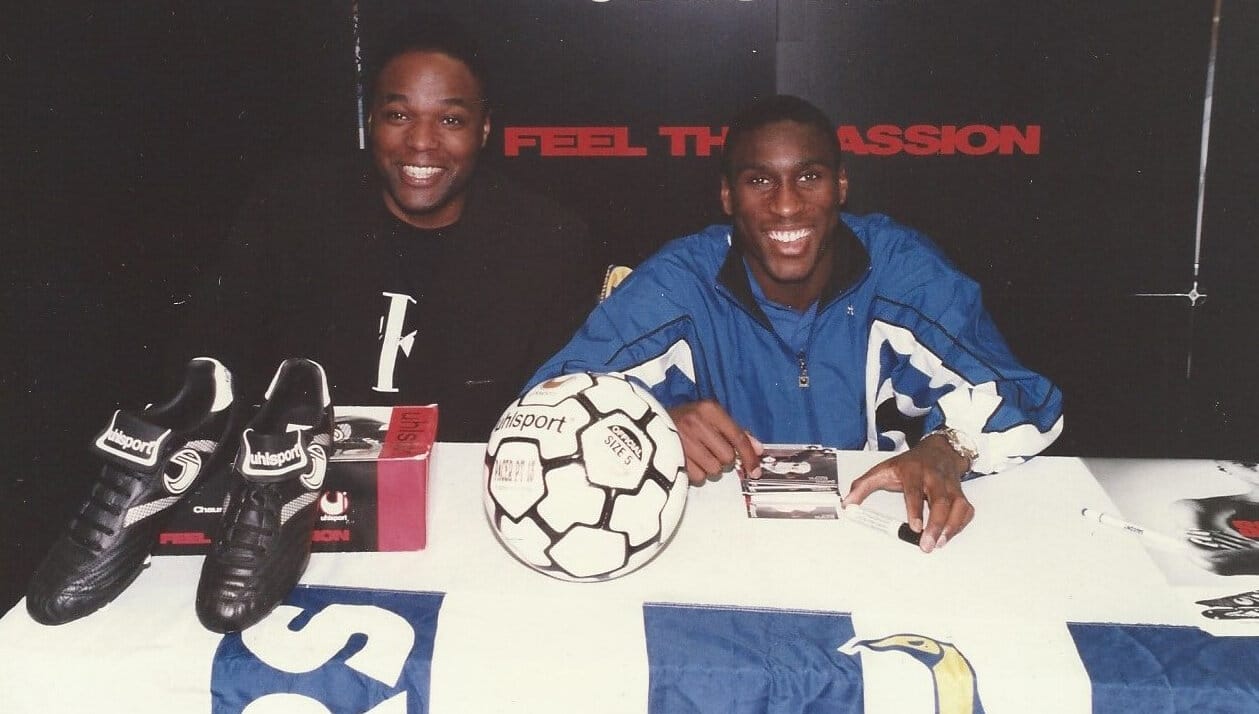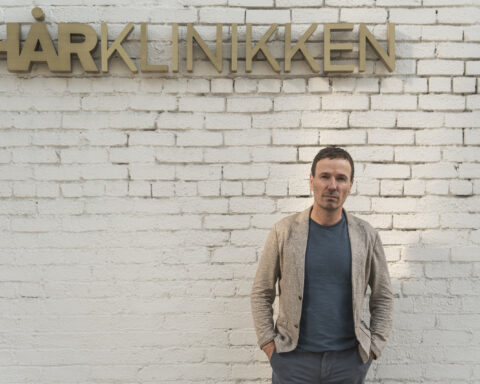Money is the biggest problem in football. It’s a problem everywhere, but particularly in football, because footballers literally live an upside down life.
What normally happens is you have gradual gratification, a guy that becomes a chief executive went to college, got a job as an intern, worked his way up. But young, talented footballers, all of a sudden they’ve got all this money. And the people around them know that money might not always be there, so they want a piece of it now.
But if you chase money, the money’s making the decisions for you. So you can’t make the right choices.
My first client was Sol Campbell, and we both came from the ghetto, as poor as you can get. Sol had numerous brothers and sisters, there were 11 or 12 of them living in a house in Forest Gate, East London. I lived nearby, in Plaistow, where we didn’t have a shower or an indoor toilet. There were six of us in two rooms, and I’d get up in the morning and there were rats everywhere.
But for some reason, even though me and Sol never had money, we didn’t let money control us. I’d come off the back of a table tennis career where I played in the Olympics, but was earning £10 or £20-a-day while on international duty. I was always focused on what was the right thing to do. So I advised Sol to focus on his craft and the money will come. Do the right things, and you’ll be happy in the end.
So when 2001 and that big deal came, we were both offered millions by different clubs all over the world. Before that, he was never on big money, he was the lowest paid player in the England team. And yet he didn’t look at that, he kept focussed. And that’s why he ended up becoming one of the highest paid footballers in the world. He’d signed a four-year contract [at Tottenham Hotspur], and that contract had finished which was why he was able to get that deal [at Arsenal]. He was patient. Most footballers or agents will just sign the next deal.
In football, and in life, there are people who don’t know you, who want to tell you what’s best for you. But I was just thinking, ‘Where was the best place for Sol to play football?’ He had the opportunity to go to every big club in the world – to Real Madrid, Barcelona, Inter Milan, Bayern Munich. The money he ended up getting was half of what he could have got at some of these clubs. But it’s a great feeling to know you can make a decision not based on money, but based on what’s best for you.

Sol and Sky announcing Sol’s retirement from playing football in 2012
A lot of agents are representing themselves. And because the clients don’t know any better, as long as they’re getting work, playing football or whatever they’re doing, they’re not that bothered. But what most clients have got to realize is that you spend a long time not doing your job. In sports. where it depends on physicality, you’re only going to be a sportsman for a certain period of time. So you can make as much money as you can, and it can go, or you can have a fantastic brand and work for the rest of your life.
When you are in a position of influence, it can be your decision to use it in a positive way. If you are relevant, and you are a top footballer or whatever, that is the time to utilize your relevance; to say what your brand stands for, what you stand for, to start to build a future in what you want to do. You don’t wait for your career to end. You have to build at the time you are relevant and create your legacy, whatever that is.
Someone in my position, who achieved what I did in 2001 with Sol’s move and was deemed to be one of the top agents in world football, most guys would have gone after the money and just said, “I need to accumulate more clients.” But I didn’t go down that road, because I wanted to mentor. I wanted to help the young players. And mentoring gives you great satisfaction because you see the fruits of your work. You’ve been on a journey, you’re older, with a bit more experience, and you can give these kids advice to help them down the road. So I got into helping and supporting the kids and their parents, and I got a lot of satisfaction out of that. Now I mentor agents and people who want to be agents all over the world on a platform called Sports Management Worldwide, and I’d like to leave a legacy in football agency work, so the next generation of agents have a moral code and the quality of management and agent work goes up. I’m trying to mentor a new generation of agents to actually care about the players development to not treat them as business, as bottles of milk, but to help them fulfill their potential as people as well as players.

Sky Andrew
What players, and people, need is honest advice. I’d say to a player, “You have a choice, you can be professional, you can work hard, you can conduct yourself in the right way, then you’ve got a chance of fulfilling your potential. If you don’t want to do that, it’s up to you.” And I’m now mentoring agents and telling them, “You’re only as good as your client, the most important thing is that your client fulfills their potential – that is success.” And there are some hard decisions when you make that pledge to fulfill your potential. That means you can’t mess about, you can’t miss training, you can’t turn up late, because all these things are negative marginal losses – and we want marginal gains.
There was a player called Jay Bothroyd at Arsenal who was one of the most talented players I’d seen, but I wasn’t representing him then. He was sold by Arsenal and he went round a lot of different clubs. Often when players are not fulfilling their potential, they end up going round to a lot of clubs, because the only thing that doesn’t change is them. But he called me up, when he was 25 or 26, and said, “Sky, I’m wasting my time.” So I went up and saw him in Coventry and spoke to him for three hours. I told him, “You’re big time, but you’ve achieved nothing. You’re driving a Bentley and wearing all these fancy colored boots, but people are not respecting you. You want all this glory, but you can have everything you want by just being a great footballer. ” And the next day, he changed his life. He wore black boots into training, he left his Bentley at home, and then this new player started to develop. He went to Cardiff City and he played for England, one of the first players to ever have played for England from the Championship [the second tier of English football]. He’s a great example of what people can do. But they need to know the truth, and then they need to make a decision. People always want to hear about the biggest deals, but Jay Bothroyd is one of the greatest stories of my career.
Men need to have people to look to, people who can inspire them who have been on their own journeys and have knowledge to share. Women are often the ones looking to do self-help and life coaching, and are involved in helping other women build their personalities and careers, and can be more proactive in asking questions and looking for advice. But men can be quite shy about asking for help, and feel under pressure to act like they’ve got it sorted and they know what they’re doing.

Sky was an Olympic table tennis player before embarking on his career as an agent
Over the years, I’ve spent a lot of my time advising people. For obvious reasons, so many men are interested in becoming an agent, particularly in football. Some years ago, the London Evening Standard did a survey of what jobs men would want to do the most and my job came second out of thousands of jobs. But it can be really tough, especially for men, who want advice and don’t know where to go.
This is why recently I started something called Amethyst Consulting, for people to be able to have a direct platform to go to for advice, whether it’s just 15 minutes, 30 minutes, or an hour. You’re only as good as the people around you. When you go on your journey, it’s your only one. And if you spend too much time trying to blag it or make out you know what you’re doing, you can end up making mistakes and going in the wrong direction. So it’s really important for people to find the right people to listen to or to get advice from, because sometimes we just need someone else to see something in us, because we’re almost too close to see it. We need someone else to say, “You can do this, you can do that.” You have to work out what you have to offer. And you’ve got more of a chance of doing that if you surround yourself with the right people. The whole consultancy space is scary for most people. So this is giving people a platform to get some time one-on-one with someone, experts in the fields of business, health and fitness and more. There’s no begging for favors involved, it’s a business arrangement. But they can just pay for half an hour, and it’s affordable. And half an hour with someone with the right experience can change your life.
Everyone’s got something to offer. You just have to know, ‘This is me, this is who I am.’ No one expected for me and my client [Sol] to be in a situation we got into, which was one of the biggest deals ever in football. You’ve just got to conduct yourself in the right way and do the best job you can do.
I didn’t make excuses. Excuses stop you from developing. If you want to look for an excuse, you can look for one anywhere. If you want to look for success, it’s a lot harder, but if you’re focused on the right things, you can find it.











